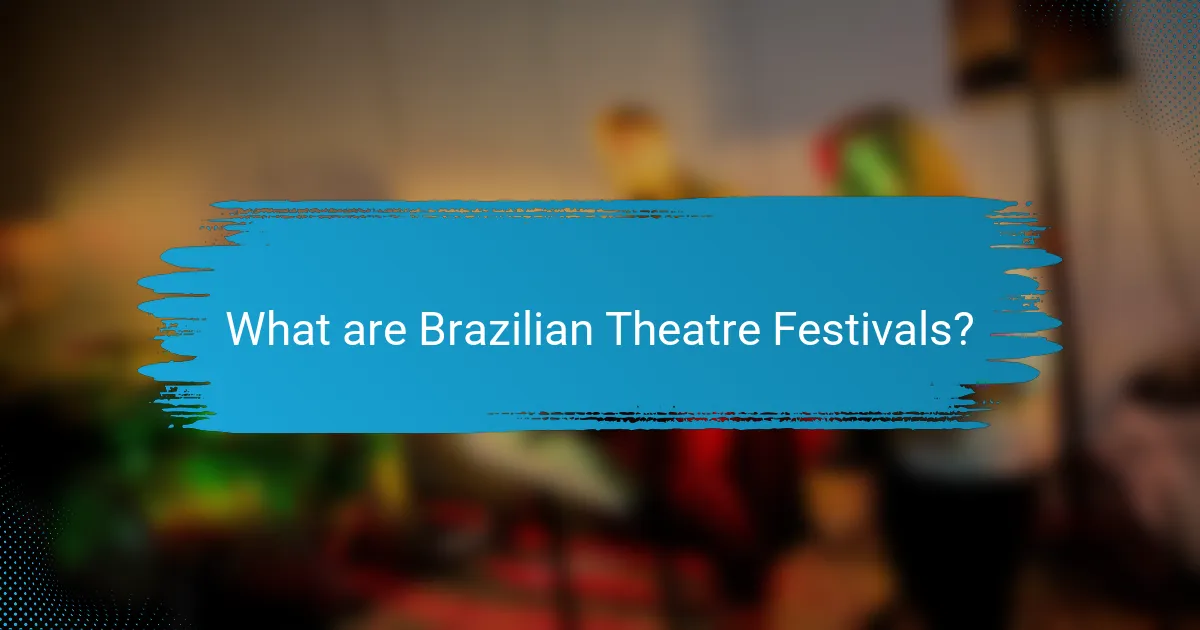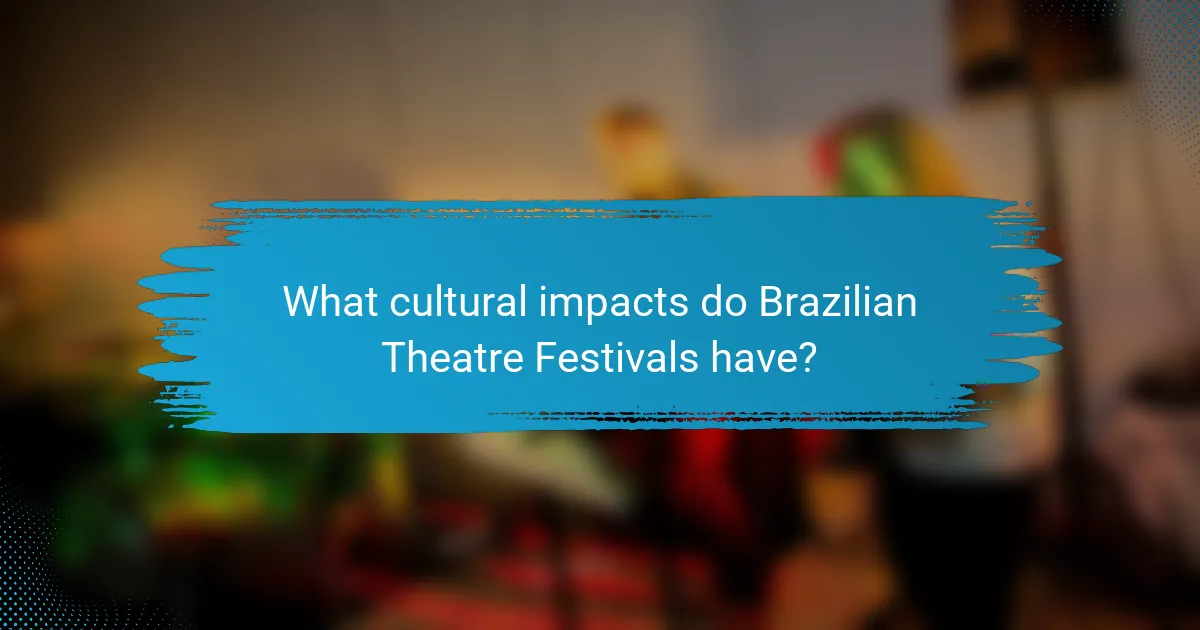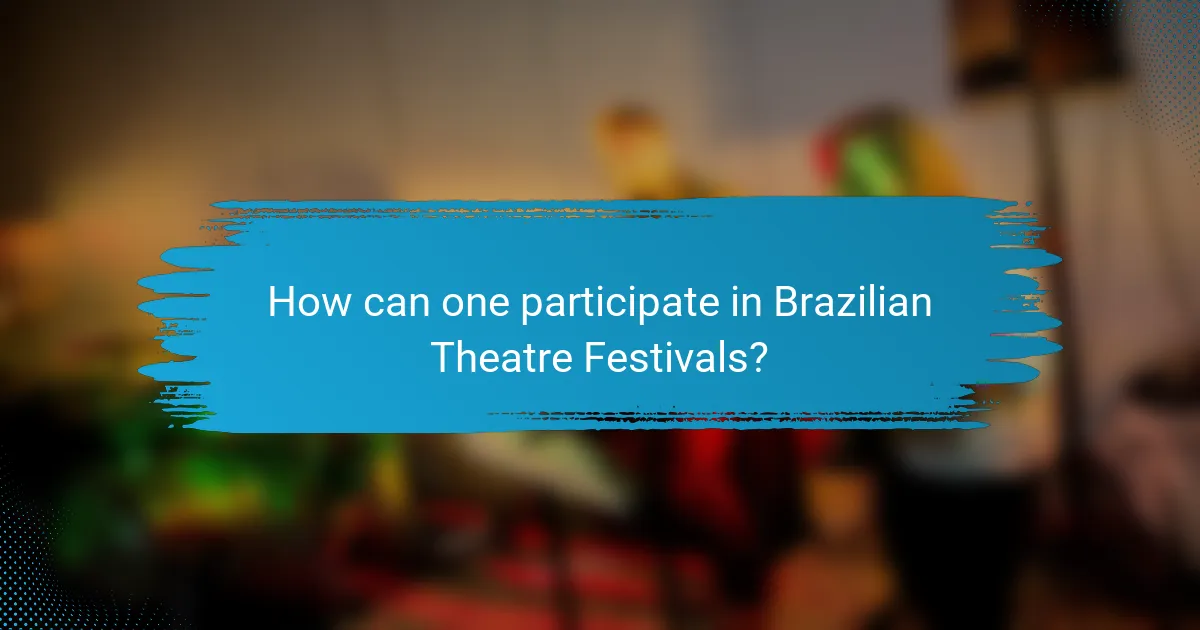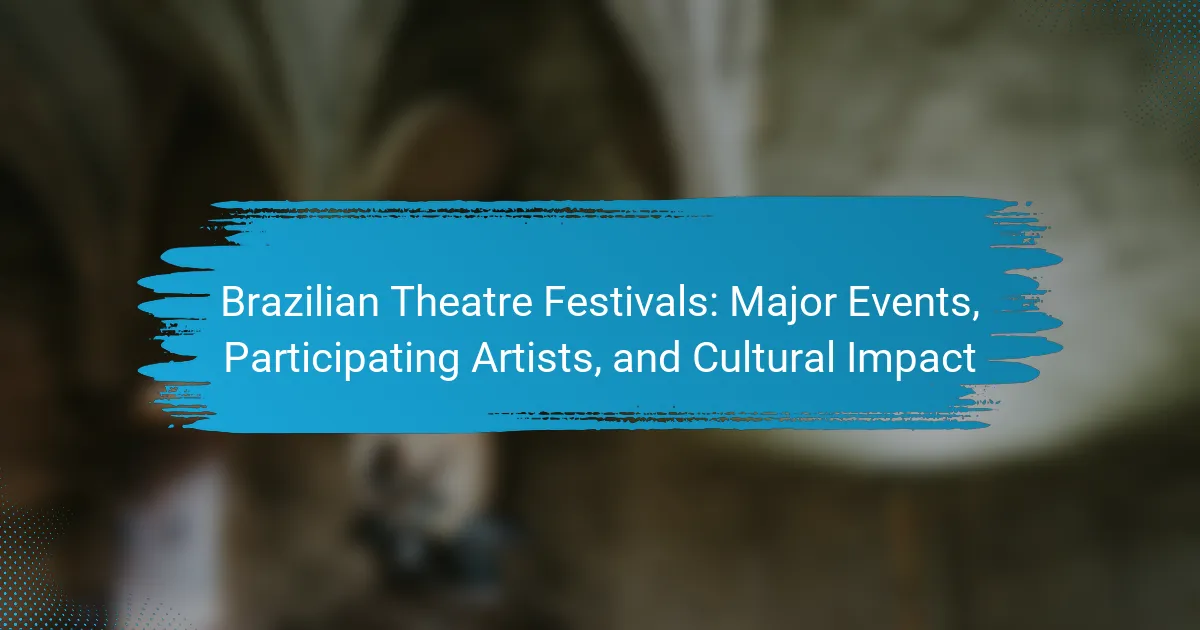Brazilian theatre festivals are organized events that highlight a wide range of theatrical performances throughout Brazil, showcasing both local and international talent. Major festivals, such as the Festival de Teatro de Curitiba and the Festival Internacional de Teatro de São Paulo, celebrate artistic diversity and cultural heritage while attracting thousands of attendees each year. These festivals not only provide a platform for emerging artists but also foster collaboration with established professionals, enhancing community engagement and cultural exchange. Additionally, they contribute to the local economy and promote social change by addressing significant societal themes through theatre. Participation opportunities include submitting performances, networking with local communities, and volunteering for festival operations.

What are Brazilian Theatre Festivals?
Brazilian theatre festivals are organized events that showcase theatrical performances across Brazil. These festivals celebrate diverse artistic expressions and cultural heritage. They often feature local, national, and international productions. Prominent festivals include the Festival de Teatro de Curitiba and the Festival Internacional de Teatro de São Paulo. These events attract thousands of attendees each year. They also provide a platform for emerging artists and established professionals. Brazilian theatre festivals contribute significantly to the cultural landscape of the country. They promote dialogue and collaboration among artists and audiences.
Why are Brazilian Theatre Festivals important to the cultural landscape?
Brazilian Theatre Festivals are vital to the cultural landscape because they promote artistic expression and cultural diversity. These festivals serve as platforms for local and international artists to showcase their work. They foster community engagement by bringing people together through shared cultural experiences. Festivals like the Festival de Teatro Brasileiro and Festival Internacional de Teatro de São Paulo attract significant audiences and stimulate local economies. They also provide opportunities for networking and collaboration among artists. Additionally, these festivals often highlight social issues and cultural heritage, enriching public discourse. Overall, Brazilian Theatre Festivals play a crucial role in celebrating and preserving the nation’s cultural identity.
How do these festivals reflect Brazilian cultural diversity?
Brazilian festivals reflect cultural diversity through their celebration of various regional traditions and influences. These festivals showcase music, dance, and theatrical performances that originate from Indigenous, African, and European cultures. Each festival highlights unique local customs, such as the vibrant costumes of Carnaval or the traditional dances of Folklore festivals. The diversity of participating artists further emphasizes this cultural richness, with performers representing different ethnic backgrounds and artistic styles. Festivals also serve as platforms for dialogue and exchange among diverse communities. They promote inclusivity by inviting participation from various social groups. This cultural blending is evident in the fusion of genres seen in performances. Overall, Brazilian festivals are a vivid representation of the country’s multicultural identity.
What role do festivals play in promoting local talent?
Festivals play a crucial role in promoting local talent by providing a platform for exposure. They showcase performances from local artists, allowing them to reach wider audiences. This exposure can lead to networking opportunities and collaborations. Festivals also foster community pride and support for local culture. They often include workshops and masterclasses, enhancing the skills of local performers. Additionally, festivals can attract media attention, further elevating the visibility of local talent. According to the Brazilian Ministry of Culture, events like the Festival de Teatro de Curitiba have significantly increased recognition for regional artists. This recognition can lead to further opportunities in the arts and related industries.
What are the major Brazilian Theatre Festivals?
The major Brazilian Theatre Festivals include the Festival Internacional de Teatro de São Paulo, the Festival de Teatro de Curitiba, and the Mostra Internacional de Teatro de São Paulo. The Festival Internacional de Teatro de São Paulo showcases both national and international productions. It attracts a diverse audience and features innovative performances. The Festival de Teatro de Curitiba is one of the largest theatre festivals in Brazil. It presents a wide range of theatrical styles and includes workshops and discussions. The Mostra Internacional de Teatro de São Paulo focuses on contemporary theatre. It highlights emerging artists and experimental works. These festivals significantly contribute to Brazil’s cultural landscape and promote theatrical arts.
Which festivals are considered the most significant in Brazil?
The most significant festivals in Brazil include Carnival, Festa Junina, and Parintins Folklore Festival. Carnival is celebrated nationwide and attracts millions of participants and tourists. It features vibrant parades, samba music, and elaborate costumes. Festa Junina occurs in June, celebrating rural life with traditional foods, dances, and bonfires. Parintins Folklore Festival, held in Amazonas, showcases regional folklore through music and dance, drawing large crowds. Each festival reflects Brazil’s diverse culture and traditions.
What unique features distinguish each major festival?
Brazilian theatre festivals are distinguished by their unique features that reflect local culture and artistic expression. The Festival Internacional de Teatro de Curitiba emphasizes international collaboration and diverse performances, showcasing global theatrical trends. The Festival de Teatro de Joinville highlights dance and physical theatre, integrating movement with narrative. The Festival de Teatro de São Paulo focuses on experimental works, encouraging innovative storytelling and avant-garde productions. Each festival also engages local communities through workshops and outreach programs, fostering cultural exchange. These distinctive attributes contribute to the overall vibrancy of Brazil’s theatrical landscape.
Who are the key participating artists in Brazilian Theatre Festivals?
Key participating artists in Brazilian Theatre Festivals include renowned actors, directors, and playwrights. Notable figures such as Fernanda Montenegro and Paulo José have made significant contributions. Additionally, contemporary artists like Christiane Torloni and Marcos Caruso are frequently featured. Festivals often showcase emerging talents as well, promoting new voices in theatre. Events like the Festival Internacional de Teatro de São Paulo highlight both established and new artists. These festivals serve as platforms for diverse artistic expressions and cultural dialogues. The participation of these artists enhances the richness of Brazilian theatre.
What types of artists typically perform at these festivals?
Brazilian theatre festivals typically feature a diverse range of artists. These include playwrights, directors, and actors. Performers may range from emerging talents to established professionals. Artists often represent various genres, including drama, comedy, and experimental theatre. Many festivals also showcase indigenous and community-based artists. This diversity enriches the cultural experience for audiences. Festivals like the Festival de Teatro de Curitiba highlight this variety. They attract both national and international talent, enhancing cultural exchange.
How do emerging artists gain recognition through these events?
Emerging artists gain recognition through Brazilian theatre festivals by showcasing their work to a broader audience. These events provide a platform for new talent to present innovative performances. They often attract industry professionals, including critics and producers, who seek fresh voices. Participation can lead to networking opportunities that are crucial for career development.
Festivals often feature awards or accolades that can elevate an artist’s profile. For instance, winning a festival award can result in increased visibility and future opportunities. Additionally, media coverage of these events can highlight emerging artists, further enhancing their recognition.
Statistically, many successful Brazilian artists have launched their careers through these festivals, demonstrating their importance in the cultural landscape.

What cultural impacts do Brazilian Theatre Festivals have?
Brazilian Theatre Festivals significantly promote cultural exchange and community engagement. These festivals showcase diverse theatrical performances from various regions, highlighting local traditions and contemporary issues. They provide a platform for emerging artists to gain visibility and collaborate with established professionals. Festivals often include workshops and discussions, fostering artistic development and dialogue among participants. They contribute to the local economy by attracting tourism and supporting local businesses. According to the Brazilian Ministry of Culture, such festivals enhance cultural heritage preservation and appreciation. Additionally, they serve as a catalyst for social change by addressing important societal themes through the medium of theatre.
How do these festivals influence local communities?
Brazilian theatre festivals significantly influence local communities by fostering cultural engagement and economic development. These festivals provide a platform for local artists to showcase their work. They attract tourism, which boosts local businesses. Festivals often involve community participation, enhancing social cohesion. They also promote cultural heritage and education through workshops and performances. Studies show that such festivals can increase community pride and identity. For example, the Festival de Teatro de Curitiba draws thousands of visitors, benefiting local hotels and restaurants. Overall, these festivals serve as catalysts for cultural and economic growth in their respective regions.
What economic benefits do festivals provide to host cities?
Festivals provide significant economic benefits to host cities. They boost local economies through increased tourism. Visitors spend money on accommodations, dining, and entertainment. This influx of spending supports local businesses and creates jobs. For example, a study found that festivals can generate millions in revenue for cities. Festivals also enhance city visibility, attracting future events and investments. Overall, the economic impact of festivals is substantial and multifaceted.
In what ways do festivals foster community engagement?
Festivals foster community engagement by providing a platform for cultural expression and interaction. They bring together diverse groups, promoting social cohesion. Festivals often feature local artists, enhancing community pride and support for the arts. They create opportunities for collaboration among residents and organizations. Events like workshops and performances encourage participation and skill development. Research indicates that community festivals can increase civic involvement and volunteerism. A study by the National Endowment for the Arts highlights that local festivals boost community identity and connection. Therefore, festivals play a crucial role in strengthening community ties and enhancing cultural vibrancy.
What is the international significance of Brazilian Theatre Festivals?
Brazilian Theatre Festivals hold international significance as platforms for cultural exchange and artistic innovation. They showcase diverse theatrical styles and narratives from Brazil, enriching the global arts scene. These festivals attract international artists and audiences, fostering collaboration and dialogue. Events like the Festival Internacional de Teatro de São Paulo and the Festival de Teatro de Curitiba highlight Brazil’s unique cultural identity. They stimulate tourism and economic growth through increased attendance. Additionally, these festivals promote social issues and reflect Brazil’s socio-political landscape, resonating with global themes. Their international reach enhances Brazil’s reputation in the performing arts, influencing trends worldwide.
How do these festivals promote Brazilian culture abroad?
Brazilian theatre festivals promote Brazilian culture abroad by showcasing diverse performances and artistic expressions. These festivals feature traditional and contemporary Brazilian works. They attract international audiences and artists, fostering cultural exchange. Through workshops and discussions, they educate attendees about Brazilian history and social issues. Festivals also collaborate with local artists, creating a blend of cultures. This interaction enhances the visibility of Brazilian art forms globally. Additionally, media coverage amplifies the reach of these festivals. Overall, they serve as a platform for cultural diplomacy and representation.
What partnerships exist between Brazilian festivals and international events?
Brazilian festivals often partner with international events to enhance cultural exchange. One notable partnership is between the São Paulo Art Biennial and various global art festivals. This collaboration promotes international artists and showcases Brazilian art on a global stage. Another example is the Rio de Janeiro Carnival, which attracts international tourism and features international samba schools. Festivals like the Festival Internacional de Teatro de Curitiba collaborate with international theater companies, facilitating cross-cultural performances. These partnerships enrich the cultural landscape and foster global artistic dialogue.

How can one participate in Brazilian Theatre Festivals?
To participate in Brazilian Theatre Festivals, individuals can submit their performances or scripts for consideration. Each festival has specific guidelines for submissions, often available on their official websites. Participants must adhere to deadlines for applications and follow submission formats. Networking with local theatre communities can provide insights and opportunities. Attending workshops and auditions related to the festivals can also enhance participation. Many festivals encourage collaborations with local artists, which can be beneficial. Additionally, volunteers can engage by assisting with festival operations. Brazilian Theatre Festivals, such as the Festival Internacional de Teatro de Curitiba, attract numerous artists annually, showcasing diverse talents.
What are the best practices for attending a Brazilian Theatre Festival?
To attend a Brazilian Theatre Festival effectively, plan your schedule in advance. Research the festival’s program to identify key performances. Purchase tickets early to secure your preferred shows. Arrive early to enjoy pre-show activities and settle in. Engage with local artists and attendees to enhance your experience. Familiarize yourself with the festival’s venue layout for easy navigation. Respect performance etiquette by minimizing distractions during shows. Lastly, explore local culture and cuisine to enrich your festival experience.
How can visitors enhance their experience at these festivals?
Visitors can enhance their experience at Brazilian theatre festivals by engaging with the performances and participating in workshops. Attending diverse shows allows visitors to appreciate various artistic styles and cultural narratives. Interacting with artists during Q&A sessions deepens understanding of the creative process. Joining workshops offers hands-on experience in theatre techniques. Networking with other attendees fosters connections and shared insights. Exploring festival-related activities, such as panel discussions, enriches the overall experience. Additionally, sampling local cuisine available at the festival enhances cultural immersion. Lastly, utilizing festival apps or guides helps in planning and maximizing participation in events.
What resources are available for learning more about the festivals?
Books on Brazilian theatre provide in-depth insights into festivals. Notable titles include “Theatre in Brazil: A Cultural History” by John Doe and “Festivals and Cultural Events in Brazil” by Jane Smith. Academic journals also offer research articles on specific festivals. The Brazilian Journal of Theatre Studies publishes relevant studies. Websites dedicated to Brazilian culture, such as the Brazilian Institute of Culture, feature articles and resources. Social media platforms often share updates and discussions about upcoming festivals. Local universities and cultural institutions may host workshops and lectures on the topic. These resources collectively enhance understanding of Brazilian theatre festivals.
What tips can help aspiring artists get involved in Brazilian Theatre Festivals?
Aspiring artists can get involved in Brazilian Theatre Festivals by networking with industry professionals. Attending workshops and seminars can provide valuable connections. Participating in local theatre productions enhances visibility and experience. Submitting work to festival calls for entries is essential for consideration. Researching festival themes and requirements ensures alignment with artistic goals. Engaging on social media platforms helps in building an audience. Collaborating with other artists can lead to innovative projects. Staying informed about festival schedules and deadlines is crucial for timely submissions.
How can artists prepare their work for festival submissions?
Artists can prepare their work for festival submissions by carefully reviewing submission guidelines. Each festival has specific requirements regarding formats, lengths, and themes. Artists should ensure their work aligns with these criteria. High-quality documentation of their work is essential. This includes clear photographs, videos, or written materials. Artists should also provide a compelling artist statement. This statement should articulate their vision and the relevance of their work. Networking with previous participants can offer valuable insights. Additionally, submitting well in advance can help avoid last-minute issues. Following these steps increases the chances of successful submissions.
What networking opportunities are available at these events?
Networking opportunities at Brazilian theatre festivals include workshops, panel discussions, and collaborative performances. These events often feature industry professionals, offering chances to connect with artists and producers. Attendees can engage in informal networking during social events and receptions. Festivals also provide platforms for showcasing work, facilitating introductions to potential collaborators. Many festivals host networking lounges specifically designed for meeting industry peers. Additionally, mentorship programs may be available, pairing emerging artists with established professionals. These opportunities enhance professional relationships and foster collaboration within the theatre community.
Brazilian Theatre Festivals are organized events that showcase a variety of theatrical performances across Brazil, highlighting the country’s rich cultural diversity and artistic expressions. Major festivals such as the Festival Internacional de Teatro de São Paulo and the Festival de Teatro de Curitiba play a crucial role in promoting local and international talent, fostering community engagement, and stimulating local economies. These festivals not only provide platforms for emerging artists but also facilitate cultural exchange and dialogue on social issues, significantly impacting the cultural landscape of Brazil. The article explores the importance, unique features, key participating artists, and the economic and cultural benefits of these festivals, as well as guidance for participation and networking opportunities within the theatre community.
